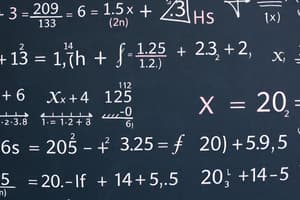Podcast
Questions and Answers
Which type of reasoning specifically derives consequences from established axioms and postulates?
Which type of reasoning specifically derives consequences from established axioms and postulates?
- Heuristic reasoning
- Inductive reasoning
- Deductive reasoning (correct)
- Analogical reasoning
Which of the following number systems includes numbers that cannot be expressed as fractions?
Which of the following number systems includes numbers that cannot be expressed as fractions?
- Natural numbers
- Integers
- Irrational numbers (correct)
- Rational numbers
What is the primary purpose of mathematical modeling?
What is the primary purpose of mathematical modeling?
- To represent real-world situations using mathematical structures (correct)
- To classify numbers into different systems
- To provide exact solutions without approximations
- To prove mathematical theorems using inductive reasoning
Which area of study heavily relies on combinatorial principles?
Which area of study heavily relies on combinatorial principles?
Which of the following is NOT a classification of numbers?
Which of the following is NOT a classification of numbers?
Which mathematical branch focuses on solving equations and inequalities?
Which mathematical branch focuses on solving equations and inequalities?
What is the primary focus of differential calculus?
What is the primary focus of differential calculus?
Which property states that changing the order of operations does not affect the outcome?
Which property states that changing the order of operations does not affect the outcome?
Which of the following concepts is fundamental to understanding probability?
Which of the following concepts is fundamental to understanding probability?
What is the study of shapes, sizes, and spatial relationships called?
What is the study of shapes, sizes, and spatial relationships called?
What do measures of central tendency include?
What do measures of central tendency include?
Which type of mathematics deals with countable objects?
Which type of mathematics deals with countable objects?
What connects differentiation with integration in calculus?
What connects differentiation with integration in calculus?
Flashcards
Number Systems
Number Systems
A system for representing and manipulating numbers, including natural numbers, integers, rational numbers, irrational numbers, real numbers, and complex numbers.
Deductive Reasoning
Deductive Reasoning
Using logical rules to derive consequences from axioms and postulates. It goes from general principles to specific conclusions.
Inductive Reasoning
Inductive Reasoning
Using patterns and observations to formulate conjectures. It goes from specific examples to general principles.
Mathematical Modeling
Mathematical Modeling
Signup and view all the flashcards
Combinatorics
Combinatorics
Signup and view all the flashcards
What is Mathematics?
What is Mathematics?
Signup and view all the flashcards
What is Arithmetic?
What is Arithmetic?
Signup and view all the flashcards
What is Algebra?
What is Algebra?
Signup and view all the flashcards
What is Geometry?
What is Geometry?
Signup and view all the flashcards
What is Calculus?
What is Calculus?
Signup and view all the flashcards
What is Probability and Statistics?
What is Probability and Statistics?
Signup and view all the flashcards
What is Discrete Mathematics?
What is Discrete Mathematics?
Signup and view all the flashcards
What are sets, functions, and groups?
What are sets, functions, and groups?
Signup and view all the flashcards
Study Notes
Fundamental Concepts
- Mathematics is a formal system of logic and reasoning used to quantify and understand patterns, relationships, and structures.
- It encompasses various branches, each focusing on specific types of problems and solutions.
- Core areas include arithmetic, algebra, geometry, calculus, and probability.
- Abstract concepts like sets, functions, and groups underpin many mathematical theories.
Arithmetic
- Arithmetic deals with basic operations on numbers: addition, subtraction, multiplication, and division.
- It forms the foundation for more advanced mathematical concepts.
- Properties like commutativity, associativity, and distributivity simplify calculations.
- Includes concepts of prime numbers, factors, and multiples.
Algebra
- Algebra uses symbols (variables) to represent unknown quantities and relationships.
- It extends arithmetic by solving equations and inequalities.
- Fundamental concepts include solving linear equations, quadratic equations, and systems of equations.
- Concepts of polynomials, exponents, and logarithms are crucial tools.
- Introduces abstract thinking, generalizing patterns, and relating variables.
Geometry
- Geometry studies shapes, sizes, and spatial relationships.
- Two-dimensional (plane) geometry focuses on figures like lines, angles, triangles, and circles.
- Three-dimensional (solid) geometry deals with objects like cubes, spheres, and cones.
- Properties of shapes, area, volume, and transformations are central topics.
- Geometric proofs are often used to derive theorems and postulates.
Calculus
- Calculus deals with continuous change and motion.
- Differential calculus examines rates of change (derivatives).
- Integral calculus studies accumulated quantities (integrals).
- Applications span physics, engineering, and economics, modeling growth, decay, optimization, and many other phenomena.
- Fundamental Theorem of Calculus connects differentiation and integration.
Probability and Statistics
- Probability studies the likelihood of events occurring.
- Statistics deals with collecting, analyzing, and interpreting numerical data.
- Probability relies on concepts such as sample spaces and events.
- Statistics uses measures of central tendency (mean, median, mode) and dispersion (variance, standard deviation).
- Tools like histograms and scatter plots display data distributions.
Discrete Mathematics
- This branch deals with countable objects (finite sets or infinite sets with a certain structure).
- Key concepts include logic, sets, combinatorics (counting principles), graph theory, and algorithms.
- Applications include computer science, operations research, and coding theory.
Number Systems
- Numbers are classified into various systems (e.g., natural numbers, integers, rational numbers, irrational numbers, real numbers, complex numbers).
- Each system builds upon the previous one, extending the range of numbers and operations.
- Understanding these systems helps in various applications.
Mathematical Reasoning
- Mathematical reasoning involves deductive and inductive arguments.
- Deductive reasoning uses logical rules to derive consequences from axioms and postulates.
- Inductive reasoning uses patterns and observations to formulate conjectures.
- Sound reasoning is crucial for proving mathematical statements and solving problems.
Mathematical Modeling
- Mathematical modeling uses mathematical structures to represent real-world situations and phenomena.
- It often utilizes equations, graphs, and other tools to analyze and predict behavior.
- It is essential in science, engineering, and social sciences, representing systems, and relationships.
Studying That Suits You
Use AI to generate personalized quizzes and flashcards to suit your learning preferences.
Description
This quiz covers the essential foundational concepts of mathematics, including arithmetic and algebra. It explores basic operations, properties, and the use of symbols to represent unknown quantities. Test your understanding of these core mathematical principles.



